AMD Ryzen Pro 5000 CPUs unveiled to take on Intel vPro — Lenovo and HP commit
Faster performance, longer battery life highlight Ryzen Pro 5000 chips
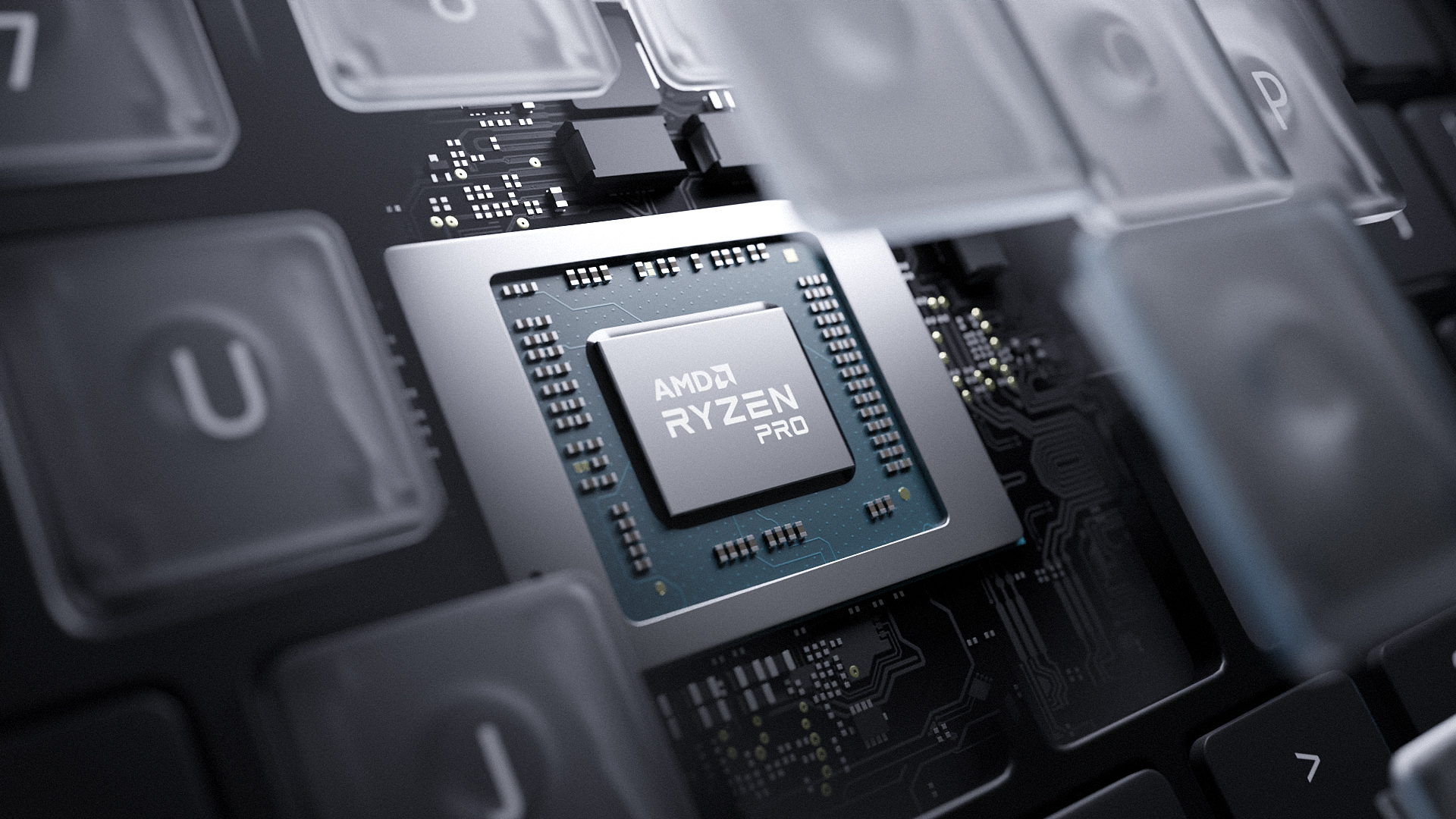
AMD unveiled today new Ryzen Pro 5000 chips, a family of processors set to power business laptops released throughout this year and next. Direct rivals to Intel's 11th Gen "Tiger Lake" vPro, AMD's new enterprise processors build upon the performance and endurance delivered by the company's impressive Ryzen 5000 chips. But it's an uphill battle. Intel, with its vPro program, has long reigned as the go-to processor for business laptops — AMD will need more than just fast speeds to convince companies to flip entire fleets of systems.
From what AMD has shown us, Ryzen Pro 5000 chips could shift the tide. Ryzen Pro 5000 will supposedly outperform comparable Intel chips in various tasks while requiring less power. Moreover, AMD promises significant battery life gains and highlights security and manageability features that should simplify the process of rolling out a fleet of laptops running on a different chip architecture. These efforts have already led to some wins, with HP and Lenovo, the two top business brands, committing to AMD-powered business notebooks.
What are AMD Ryzen Pro 5000 CPUs?
For the uninitiated, Ryzen Pro 5000 CPUs are AMD's latest business laptop chips. They use the same architecture as the Ryzen 5000 chips found in consumer laptops, but add several enterprise features for improved security and manageability. You can think of them as AMD's answer to Intel vPro.
These processors will be found in Windows 10 laptops, desktops and workstations throughout 2021 and likely into 2022. AMD says enterprise-grade Chromebooks will rely on the non-Pro versions of these chips. Intel continues to lead AMD when it comes to the number of business laptops, or "designs," launching with its chips. However, AMD has seen a 3x growth in designs from 2018 to 2021, meaning there are more AMD-powered business systems on the market than ever before. The company has doubled its share of commercial notebooks in the past 3 years.
AMD Ryzen Pro 5000 product family
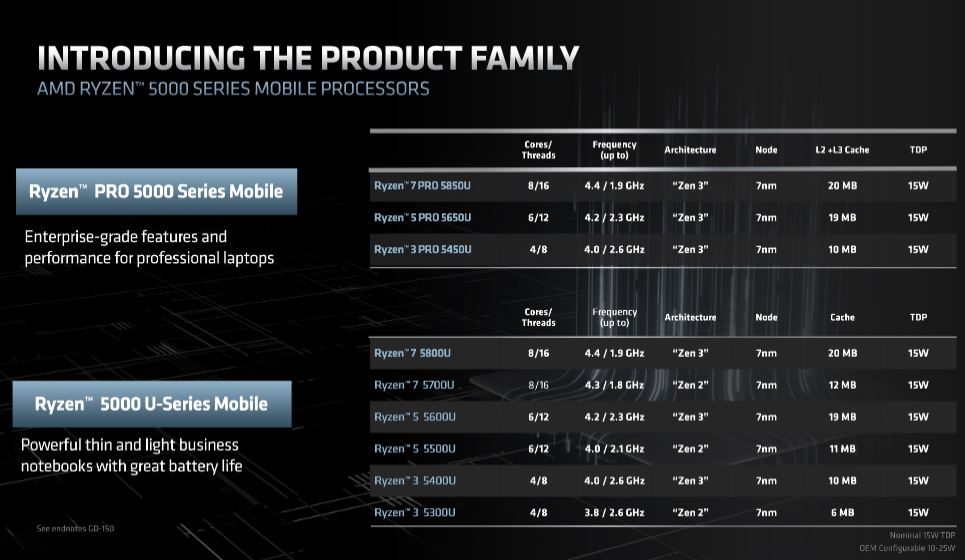
As you can see in the above table, Ryzen Pro 5000 comes in Ryzen 3, Ryzen 5 and Ryzen 7 flavors with the higher the number indicating the more cores and threads. These new processors are all 7 nanometers, have a 15W TDP, and are based on the Zen 3 architecture.
AMD keeps things simple, offering only three enterprise-class Ryzen 5000 CPUs. Topping the stack is the Ryzen 7 5850U, a business version of the Ryzen 75800U. This chip has 8 cores and 16 threads operating at a max frequency of 4.4 GHz. AMD says this is the only processor with eight high-performance cores in a thin-and-lightweight laptop.
In the middle of the pack is the Ryzen 5 Pro 5650U CPU with six cores and 12 threads and a max frequency of 4.2 GHz. Cheaper models with lower power will use the Ryzen 3 Pro 5650U CPU with four cores and eight threads and a max boost of 4.0 GHz.
Sign up to receive The Snapshot, a free special dispatch from Laptop Mag, in your inbox.
Ryzen Pro 5000 performance vs. Intel 11th Gen vPro
AMD isn't beating around the bush; the company believes its Pro 5000-series chips can outpace Intel 11th Gen processors. As proof, AMD provided us with various benchmarks between the Ryzen 7 Pro 5850U and the Intel Core i7-1185G7 CPU.
While this is a fair comparison (the Core i7-1185G7 CPU is Intel's most powerful 12-28W chip), keep in mind that these benchmarks were run by AMD and that we have not independently verified the results. It's possible, even likely, that other benchmarks swing in favor of Intel.
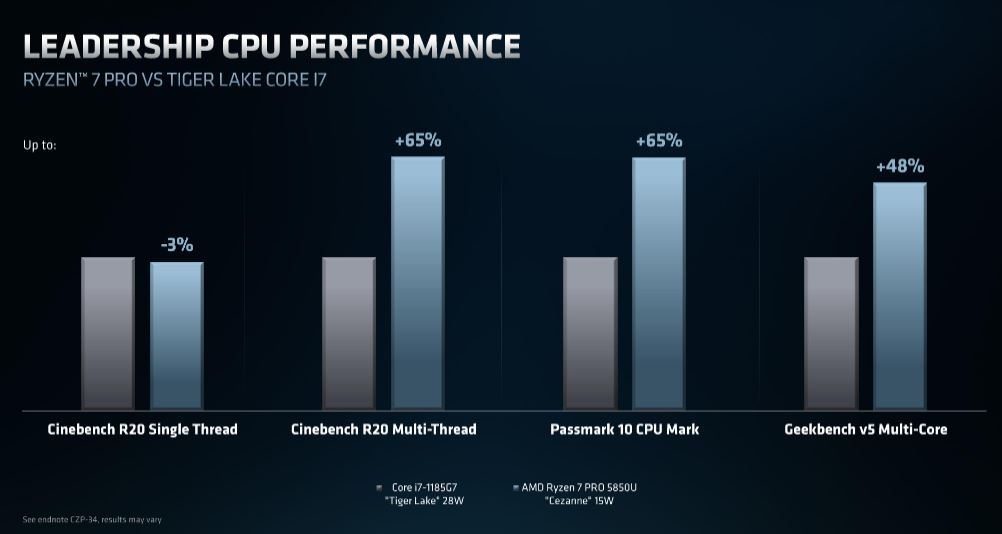
Having said that, AMD claims the Ryzen 7 Pro 5850U delivers 65% faster performance than the Core i7-1185G7 CPU in the Cinebench R20 multi-thread test and the Passmark 10 CPU Mark benchmark. The company also says its processor is 48% faster on the Geekbench 5 overall performance test, a reliable benchmark we use. Interestingly, AMD admits the Intel chip is better at single-thread performance, if only by a hair.
AMD goes one step further, claiming that even the Ryzen 5 Pro CPU is quicker than a Core i7, with 26% faster Passmark 10 CPU and Geekbench 5 scores, as well as 4% faster PCMark 10 apps and 20% PCMark 10 Benchmark scores. No single-threaded comparisons were provided.
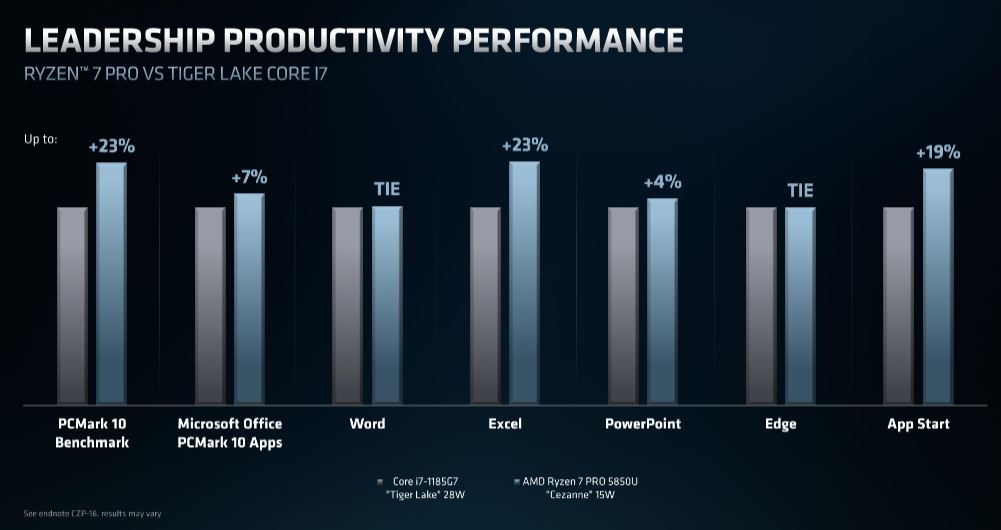
Going back to the Ryzen 7 vs. Core i7, AMD says its chip is quicker in various real-world tests. While it ties the Core i7 CPU when running Word and Edge, the Ryzen 7 is supposedly 4% faster in PowerPoint, 23% faster in Excel and 7% quicker on the Microsoft Office PCMark 10 Apps benchmark. Furthermore, the Ryzen 7 is said to be 10% faster than the Core i7 when running Zoom calls with 49 participants.
Ryzen Pro 5000 battery life
Being fast and strong is cool and all, but remember, these are mobile chips, so they need to be marathon runners as well. To that end, AMD promises 17.5 hours of battery life from the Ryzen 7 Pro 5850 CPU when running the Mobilemark 2018 benchmark. That is an additional 1.5 hours of battery life over the previous Ryzen 4000 model (16 hours).
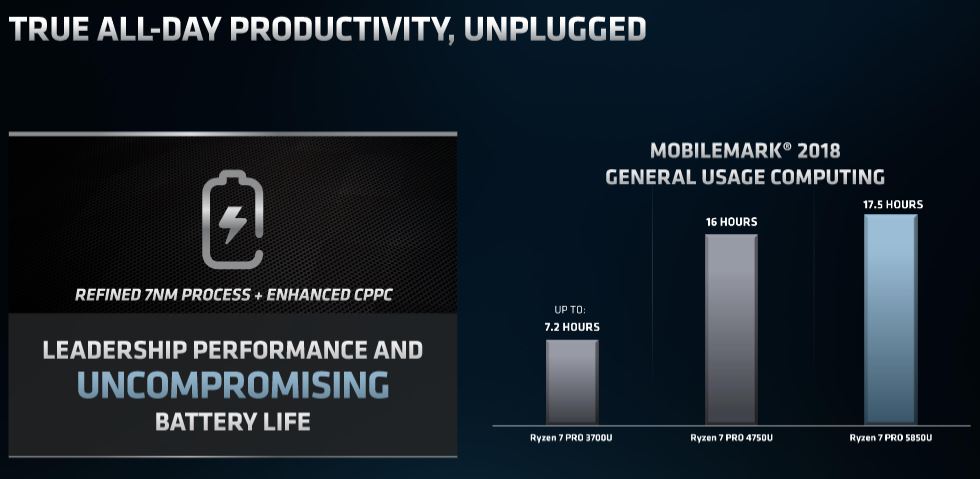
As always, we need to put an asterisk next to these claims. Synthetic tests are one thing, real-world battery life is another. We'll get a better idea of how long the Ryzen Pro-powered systems last when we run them through our own battery test, which involves continuous web browsing over Wi-Fi at 150 nits.
Ryzen Pro 5000 security and manageability
You might be wondering why someone would buy a Ryzen Pro chip instead of the cheaper consumer versions. Part of the reason is security. AMD goes with a multi-layered approach wherein the Ryzen 3 architecture has a Shadow Stack meant to mitigate malware attacks. On top of that is a FIPS 140-3-certified (a government security standard) processor along with Memory Guard and all the security features that come with Windows 10. This is all before you get to the security apps pre-installed by OEMs.
Deploying a fleet of laptops with Ryzen 5000 chips could be a significant hurdle for companies that have relied on Intel-powered CPUs in the past. AMD claims each Pro-series chip allows for "seamless deployment" and "simplified management at scale" so an IT admin can quickly get hundreds of laptops up and running without too much headache. Other perks include 18 months of security support and 24 months of CPU availability.
Ryzen Pro 5000 coming soon
As previously mentioned, the number of laptops set to come with AMD Ryzen Pro 5000 CPUs is significantly higher than it has been in previous years. More specifically, 63 laptops and configurations are expected to arrive in 2021 with AMD Ryzen Pro. Among the highlights is a trio of notebooks from HP and Lenovo.
HP will release an AMD-powered version of the EliteBook 845 G8 while the ProBook Aero 635 G2 and ProBook x360 435 G8 will be AMD exclusives in 2021. Lenovo is launching the ThinkPad T14S and ThinkBook 14S with AMD CPUs while the ThinkBook 16P will be an AMD exclusive.
Given the performance and endurance claims seen with these Ryzen Pro 5000 chips, we hope they eventually find their way not just into budget and mid-range systems but also into some of the best business laptops, like the ThinkPad X1 Carbon and HP EliteBook 840 G7.
Phillip Tracy is the assistant managing editor at Laptop Mag where he reviews laptops, phones and other gadgets while covering the latest industry news. After graduating with a journalism degree from the University of Texas at Austin, Phillip became a tech reporter at the Daily Dot. There, he wrote reviews for a range of gadgets and covered everything from social media trends to cybersecurity. Prior to that, he wrote for RCR Wireless News covering 5G and IoT. When he's not tinkering with devices, you can find Phillip playing video games, reading, traveling or watching soccer.

